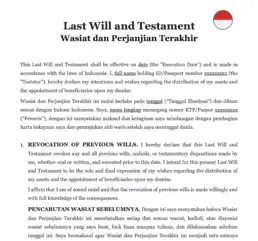Ready to use legal template
Drafted by experienced lawyers
Indonesian-English translation
Ready to use legal template
Drafted by lawyers
Indonesian-English translation
Home › Family law › Testament
Learn more about Testament in Indonesia
A Testament, also known as a Will, is a legal document that allows an individual to express their wishes regarding the distribution of their assets, care of minor children, and other personal matters after their death. In Indonesia, preparing a clear and valid Testament is essential to ensure your estate is distributed according to your intentions and to help prevent potential disputes among heirs. It serves as a critical tool for estate planning, offering peace of mind and legal clarity for your loved ones. At Themis Partner, our Testament template is carefully crafted to meet local legal standards and is suitable for use across Indonesia. Download our Testament, easy to edit in Word format, drafted by experts in English and Indonesian.
Table of contents
What is a testament in Indonesia?
What is the purpose of a testament estate planning?
What should it include under Indonesian law?
What are the implications of not having a testament?
Can a testament be challenged or contested in Indonesia?
How can a testament be amended or revoked?
How are executors and trustees appointed?
What is a testament in Indonesia?
In Indonesia, a testament is a legal document that expresses a person’s wishes regarding the distribution of their assets after death. Known as a will, it is an essential component of estate planning, allowing individuals to dictate how their assets should be allocated to beneficiaries. The process of creating a valid testament in Indonesia typically involves drafting the document through a Notarial Deed, which must then be registered with the Ministry of Law and Human Rights. The Indonesian Civil Code stipulates that a testator can bequeath only one-third of their estate to non-direct descendants, ensuring that two-thirds benefit direct family members. This legal framework ensures that a person’s final wishes are honored and provides clear instructions for asset distribution after their passing.
What is the purpose of a testament estate planning?
The purpose of a testament in estate planning is to establish a clear and legally binding document that outlines an individual’s wishes regarding the distribution of their assets and the handling of their affairs after their death. Estate planning involves making arrangements to ensure that one’s assets are managed and transferred according to their intentions, while also considering the welfare of their loved ones. By creating a testament, individuals can specify who will inherit their property, appoint guardians for minor children, name an executor to administer their estate, and make provisions for special circumstances or specific bequests. It serves as a vital tool in providing peace of mind, ensuring that one’s assets are distributed as desired, minimising conflicts among family members, and preserving the financial well-being of future generations.
What should it include under Indonesian law?
1. Identification
The testament should start with the testator’s personal information, including their full name, address, and any relevant identification numbers.
2. Appointment of Executor
The testator should appoint an executor, who will be responsible for administering the estate and ensuring the distribution of assets according to the testament’s instructions.
3. Asset Distribution
The document should clearly outline how the testator wishes their assets, including properties, investments, bank accounts, and personal belongings, to be distributed among the beneficiaries. Specific bequests, such as sentimental items or charitable donations, should be included as well.
4. Appointment of Guardians
If the testator has minor children, the document should designate guardians who will have the responsibility of caring for and raising the children in the event of the testator’s death.
5. Contingency Plans
It is advisable to include contingency plans, such as alternate beneficiaries or guardians, in case the primary choices are unable or unwilling to fulfill their roles.
6. Revocation of Previous Wills
The testator may want to expressly revoke any previous wills or testamentary documents to ensure that the current testament takes precedence.
7. Signature and Witness Requirements
The document must be signed by the testator in the presence of witnesses who are not beneficiaries or potential beneficiaries. It should include the signatures of the witnesses as well.
What are the implications of not having a testament?
Not having a testament, or a will, can have significant implications for the distribution of assets and the handling of one’s affairs after their death.
1. Without it, a person’s assets will be distributed according to the intestacy laws of the jurisdiction in which they reside. These laws typically prioritise spouses, children, and other close relatives as beneficiaries in a predetermined order.
2. The lack of a testament can result in assets being divided in a manner that may not align with the individual’s preferences or intentions.
3. It can also lead to delays and complications in the probate process, as the court will need to appoint an administrator to handle the estate.
4. Additionally, without it, there is no provision for specific bequests, appointment of guardians for minor children, or considerations for unique family circumstances or charitable donations.
5. By not having this document, individuals relinquish the opportunity to have control over their assets, potentially causing difficulties and disputes among family members and beneficiaries.
Can a testament be challenged or contested in Indonesia?
Yes, a testament can be challenged or contested in Indonesia. Challenges to a testament, also known as a will, can arise if there are concerns about the testator’s capacity at the time of making the will, the presence of undue influence, or if the will does not comply with legal formalities. In Indonesia, the Civil Code provides the legal framework for contesting a will. If a will is contested, the matter is typically resolved in the court system, where the validity of the will and the testator’s intentions are examined. It’s important for the will to be properly drafted and witnessed to withstand potential challenges
How can a testament be amended or revoked?
In Indonesia, a testament can be amended or revoked by the person who created it, known as the testator. To amend a testament, the testator can create a new testament that includes the changes and explicitly states that it revokes the previous testament. The new testament must be executed with the same formalities as the original, typically through a Notarial Deed, and then registered with the Ministry of Law and Human Rights.
To revoke a testament, the testator can either create a new testament that states the revocation of all previous testaments or physically destroy the original testament document. If the testament is destroyed, it is advisable to do so in the presence of witnesses to avoid any future disputes about the testator’s intentions.
How are executors and trustees appointed?
In Indonesia, executors and trustees for testaments are appointed through the will of the deceased, known as the testator. The will should clearly name the individuals or entities designated as executors and trustees, outlining their responsibilities in managing and distributing the testator’s assets according to the will’s instructions. If the will does not specify an executor, the court may appoint one. The role of the executor is to administer the estate, while trustees are responsible for managing any trusts established by the will for beneficiaries. Executors and trustees must act in the best interest of the beneficiaries and in accordance with Indonesian law.
Share information
Why Themis Partner ?
Make documents forhundreds of purposes
Hundreds of documents
Instant access to our entire library of documents for Indonesia.
24/7 legal support
Free legal advice from our network of qualified lawyers.
Easily customized
Editable Word documents, unlimited revisions and copies.
Legal and Reliable
Documents written by lawyers that you can use with confidence.




